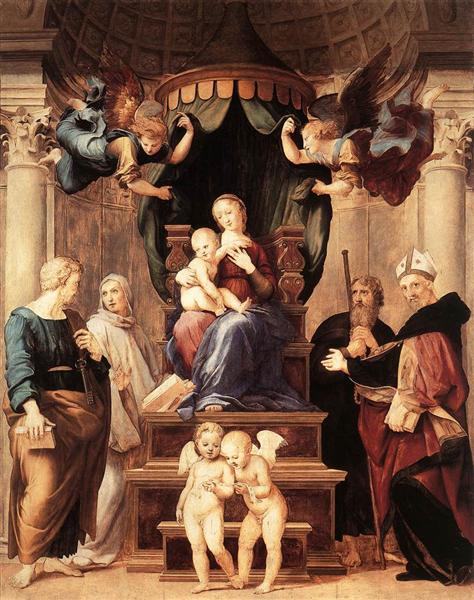Beskrivning
Arbetet "Virgen del Baldaquino" (1506) av Rafael är en av de mest distinkta manifestationerna av renässansen, en period som kännetecknas av sökandet efter kompositionsbalans och känslomässigt djup i representationen av det heliga. Denna målning, som fungerar som ett altare för Marian Veneration, kapslar in den religiösa glädjen av sin tid, utöver det utsökta sättet som Rafael kombinerar sin konstnärliga talang med tidens andliga övertygelser.
I detta arbete är den centrala figuren Jungfru Maria, som presenteras i en symmetriskt balanserad och omslutande sammansättning. Hon stöder barnet Jesus, som i sin tur står som en symbol för nåd och frälsning. Jungfruens position är lugn och utstrålar en aura av sötma och medkänsla som lockar tittarens uppmärksamhet. Utseendet mot barnet är laddat med ömhet och skydd, vilket kapslar in en av de viktigaste representationerna av mödrar. Barnets representation i armarna, med sitt lilla ansikte inriktat på åskådaren, fungerar som en kontaktpunkt som skapar en omedelbar koppling mellan arbetet och den som observerar det.
En anmärkningsvärd aspekt av denna målning är användningen av hink eller tak, som är på Mary. Denna arkitektoniska ramverk ramar inte bara in jungfrun, utan höjer också sin status, vilket gör det till en siffra som är värd att dyrka. Detta barockelement kan betraktas som en ingress när man utvecklar i den bakre barocken, men i händerna på Rafael är dess användning mer subtil, vilket ger en känsla av helighet till den allmänna sammansättningen utan att överbelasta den.
Färgerna på målningen är av underbar mjukhet och väljs noggrant för att lyfta fram renheten i jungfrufiguren. Blues av hans mantel kontrast beundransvärt med de varma tonerna i bakgrunden, vilket innebär en evokation av renässansidealet om symmetri och kromatisk harmoni. Den avsiktliga användningen av ljus och skuggor ger ett intryck med tre dimensionalitet, vilket genererar en atmosfär som är både himmelsk och jordisk.
Arbetet presenterar också ett subtilt symboliskt innehåll som avslöjar renässansen. Rafael, som andra konstnärer i sin tid, använder varje element i målning med ett syfte: den vita blomman i manteln av Mary symboliserar hennes oskuld, medan den blå manteln representerar hennes gudomliga status. Varje del av arbetet är utformat för att ansluta det andliga planet till tittarens upplevelse i den fysiska världen.
Ur den tekniska synvinkeln exemplifierar "Virgen del Baldaquino" Rafaels domän i användningen av perspektiv och proportion. Den arkitektoniska bakgrunden som presenterar bågar och linjer som leder utseendet mot den centrala figuren belyser målarens förmåga att skapa ett djup som inbjuder att komma in i scenen. Nyanserna i representationen av rymden och ljus pekar på renässanssökningen efter idealisering av skönhet och verklighet.
Sammanfattningsvis är "Virgen del Baldaquino" inte bara ett religiöst porträtt, utan en symbol för renässansidealet, där andlighet och konst smälter samman till en perfekt enhet. Rafaels behärskning i skapandet av kompositioner som överför en djup känsla av känslor och transcendens här manifesteras tydligt. När målningen avslöjar dess subtila detaljer och dess visuella prakt, är den etablerad som ett bestående vittnesbörd om den djupa hängivenheten och den extraordinära tekniska förmågan som kännetecknar renässanslärarens arbete.
KUADROS ©, en berömd färg på din vägg.
Handgjorda oljemålningar, med kvaliteten på professionella konstnärer och den distinkta tätningen av KUADROS ©.
Bilder reproduktionstjänst med tillfredsställelsesgaranti. Om du inte är helt nöjd med kopian av din målning, återbetalar vi dina pengar 100%.

